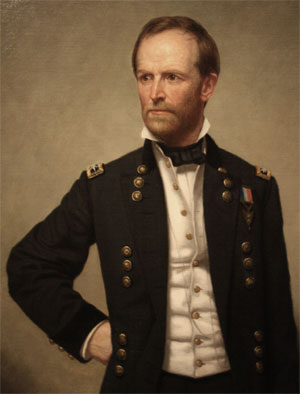
Source: William T. Sherman, Wikimedia

Source: William T. Sherman, Wikimedia
On the eve of the Civil War, as South Carolina prepared to vote to be the first state to secede from the United States, remarked:
"You people of the South don't know what you are doing. This country will be drenched in blood, and God only knows how it will end. It is folly, madness, a crime against civilization!...War is a terrible thing!... Where are your man and appliances of war to contend against them? The North can make a steam engine, locomotive or railway car, hardly a yard of cloth or a pair of shoes can you make. You are rushing into war with one of the most powerful, ingeniously mechanical people on earth - right at your doors. You are bound to fail."
→ Reflection: What differences between the North and South does Sherman highlight which would lead to Southern failure in the War?
Sherman's quote quite accurately predicted the bloodiest conflict in U.S. history and its ultimate conclusion. America would suffer more casualties in the Civil War than in all her other wars combined, from the American Revolution through the Vietnam War in the mid-20th century, and the South failed to win her independence.
The passage also hinted at how different the North and South had become. Of course, one was free and the other had slaves. But also, one was highly industrial and urban, the other completely agricultural and rural. The North also had more states and a significantly greater population than the South. These further heightened the tensions between the two societies.
In this resource, you will examine the underlying differences between the North and the South as well as the specific events that led to the Civil War. These contrasts created the tension, but it took events to "turn up the heat" and explode into war.